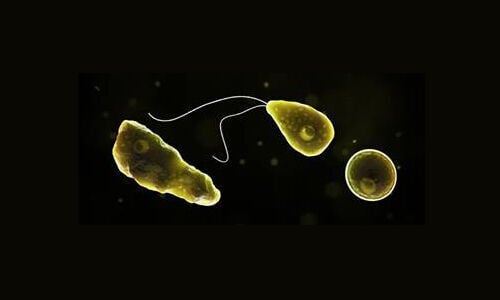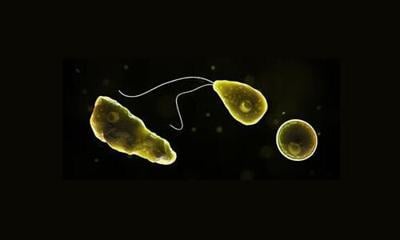ST. LOUIS ŌĆö A man is battling for his life at a ╣¹Į┤╩ėŲĄ-area hospital after being infected with a rare brain-eating amoeba after waterskiing at the Lake of Ozarks last week, according to state health officials.
The Missouri Department of Health and Senior Services reported on Tuesday that the Missouri resident has a laboratory-confirmed infection of Naegleria fowleri, a microscopic amoeba commonly found in warm fresh water such as lakes, river and ponds.
The manŌĆÖs symptoms began Friday, and he has been hospitalized since Sunday. No other information about the victim was provided.
The amoeba is particularly active when water temperatures exceed 77 degrees. The water temperature in Lake of the Ozarks ranges from 75 to 86 degrees in August, according to fishing websites.
People are infected when water containing the parasite enters the body through the nose, usually while victims are swimming or diving. The infection can cause primary amebic meningoencephalitis, which quickly leads to severe brain damage.
People are also reading…
Early symptoms of the condition include headache, fever, nausea and vomiting. It usually leads to coma and death after just five days.
The condition is rare. Between 1962 and 2024, there were 167 reported cases in the United States, according to the Centers for Disease Control and Prevention. And it is almost always deadly. Only four of the cases survived.
Dr. Farrin Manian, an infectious disease specialist, with Mercy ╣¹Į┤╩ėŲĄ, said treating the infection involves using anti-fungal medications to kill the parasite as well as steroids to reduce brain swelling.
Because the condition is so rare, determining what works best in humans is challenging, Manian said. Another challenge is the speed at which the damage takes hold.
ŌĆ£It basically goes into the brain so quickly with lot of inflammation and sometimes hemorrhage, that itŌĆÖs very difficult to catch up with,ŌĆØ Manian said. ŌĆ£Even very effective drugs may not have a chance to work.ŌĆØ
Manian said that he tells people that flu-like symptoms in the middle of summer could be a sign of something serious.
ŌĆ£If youŌĆÖve been in water, especially warm water this time of year, and you start getting headaches and fever and, you know, feeling terrible,ŌĆØ he said, ŌĆ£I would say you should seek medical attention immediately.ŌĆØ
The last Missouri resident to die from the brain-eating infection was in July of 2022, after swimming in Lake of Three Fires in southwestern Iowa. The residentŌĆÖs age was not released. The only other case identified among Missouri residents occurred in 1987, according to state health officials.
Nathan Koffarnus, an epidemiologist with DHSS, urged residents to take precautions.
ŌĆ£This is an organism that we could find in just about any freshwater source, especially this time of year when the water is so warm,ŌĆØ Koffarnus said. ŌĆ£The general guidance is to consider that itŌĆÖs probably present and to take precautionary measures.
ŌĆ£It has to involve some pretty forceful water going up the sinuses,ŌĆØ he said.
Last month, 12-year-old Jaysen Carr died from the amoeba two weeks after spending Fourth of July swimming in one of South CarolinaŌĆÖs most popular lakes.
His parents told the Associated Press that they had no clue the amoeba even existed.
JaysenŌĆÖs case was not publicly released, so the parents spoke out about the loss of their son to warn others. ŌĆ£I am terrified it will happen to someone else,ŌĆØ Calrence Carr told the AP.
Koffarnus said health officials are considering whether any further prevention measures are needed. Water testing is not helpful, he said, because there is no science-based threshold for what is considered unsafe in fresh water.
For now, Missouri health officials want to get the word out about the infection and educate residents about how to protect themselves.
ŌĆ£ItŌĆÖs definitely a terrible illness,ŌĆØ Koffarnus said. ŌĆ£We hope that people, if theyŌĆÖre worried about it, just either hold off on visiting those places until the weather cools down a little bit or take appropriate precautions to not put their head underwater.ŌĆØ
The CDC reports that a few infections have occurred when people used tap water that contained the amoeba to rinse their sinuses or cleanse their nasal passages.
In very rare instances, people have become infected from recreational spots like splash pads and a surf park that did not have enough chlorine.
To help protect yourself against a Naegleria fowleri infection, the CDC suggests:
- Hold your nose or wear a nose clip if you are jumping or diving into fresh water.
- Always keep your head above water in hot springs.
- DonŌĆÖt dive in shallow water because the amoeba is more likely to live there.
- Use distilled or boiled tap water when rinsing your sinuses or cleansing your nasal passages.
Two weeks after spending the Fourth of July on a popular South Carolina lake, 12-year-old Jaysen Carr died from a brain-eating amoeba that was living in the warm water.
















